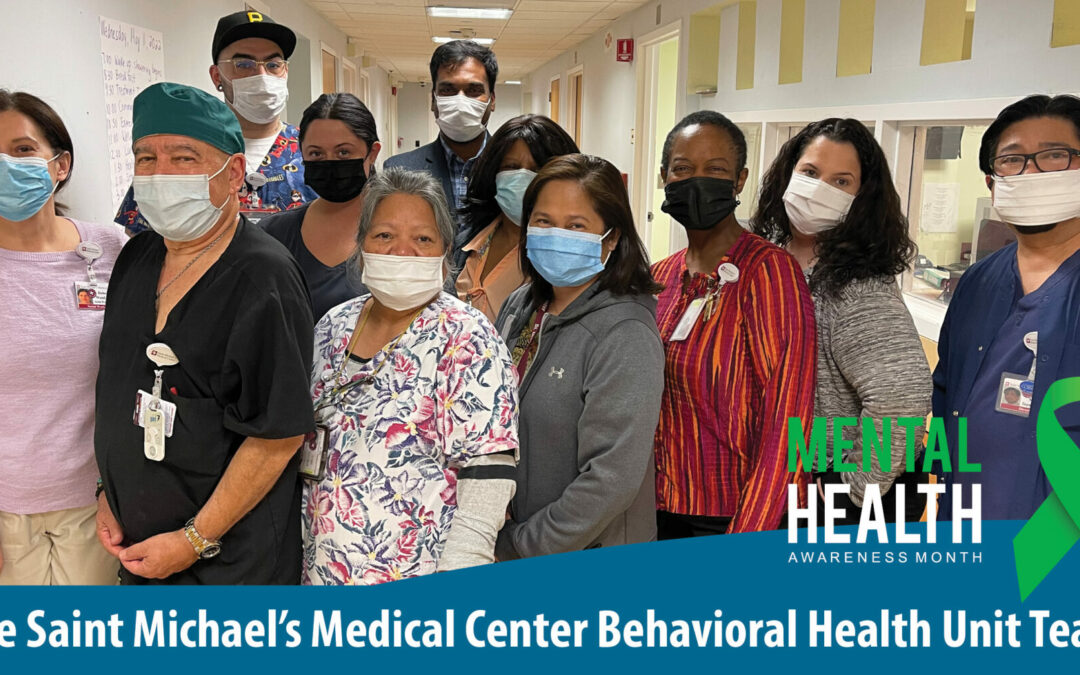This May, Saint Michael’s Medical Center in Newark is highlighting the importance of mental health for Mental Health Awareness Month. Maintaining positive mental health and treating any mental health condition is important to stabilizing constructive behaviors, emotions, and thoughts.
Focusing on mental health care can increase your productivity, enhance self-image, and improve relationships. Nurturing mental health doesn’t just improve daily functioning, but it can also help manage or combat physical health problems linked to mental health conditions.
Mental health is essential for a person’s overall health. Prevention and treatment can help people recover from mental disorders and live full and productive lives. The Behavioral Health Unit at Saint Michael’s Medical Center offers voluntary inpatient treatment for those with psychiatric disorders such as:
- Acute Behavioral Crisis
- Generalized Anxiety Disorders
- Major Depressive Disorders
- Schizophrenia
- Suicidal behaviors or thoughts
The primary goal of the Behavioral Health Unit is to provide a safe and therapeutic environment in order to stabilize the patient’s presenting symptoms and allow them to return to a fulfilling and productive life.
During a patient’s stay, the Behavioral Health Unit team works with the patient and their family/significant others (when clinically appropriate) to create an individualized plan of care based on the patients stated goals. Treatment provided includes:
- Psychiatric evaluation
- Medical evaluation
- Psychotherapy
- Group therapy
- Co-Occurring Disorder counseling
- Medication management
- Discharge planning
- After Care Follow-up Referral
- And much more.
 “At Saint Michael’s, we employ an interdisciplinary team approach to psychiatric care,” said Dr. Venkata Sugnanam, medical director and attending physician in Saint Michael’s Medical Center Behavioral Health Unit. “We believe in caring for the whole person — body, mind and spirit. This Mental Health Awareness Month we recognize our team that provides care for our patients from treatment to recovery.”
“At Saint Michael’s, we employ an interdisciplinary team approach to psychiatric care,” said Dr. Venkata Sugnanam, medical director and attending physician in Saint Michael’s Medical Center Behavioral Health Unit. “We believe in caring for the whole person — body, mind and spirit. This Mental Health Awareness Month we recognize our team that provides care for our patients from treatment to recovery.”
Dr. Venkata said the COVID-19 pandemic has impacted many people. The World Health Organization reports that in the first year of the COVID-19 pandemic, global prevalence of anxiety and depression increased by a massive 25%”.
“We are seeing increased signs of depression, grief and anxiety disorders since the peak of the pandemic,” Dr. Venkata said. “Multiple stress factors are thought to be causes of the increase such as increase is in stress caused by the social isolation resulting from the pandemic. Linked to this were constraints on people’s ability to work, seek support from loved ones and engage in their communities.”
Dr. Venkata said other factors, such as loneliness, fear of infection, suffering and death, grief after bereavement and financial concerns have also all been attributed to stress triggers leading to anxiety and depression.
“We encourage you to focus on your self-care as that has an impact on your mental and physical health,” Dr. Venkata said.
Take care of your body
- Get enough sleep
- Exercise regularly
- Maintain a healthy diet
- Avoid tobacco, alcohol and drugs
- Limit screen time on cell phones and computer
- Relax and recharge
Take care of your mind by reducing stress triggers:
- Keep your regular routine
- Limit exposure to news media
- Focus on positive thoughts
- Set priorities
For more information, please contact the Psychiatric Intake Service at 833-310-1588 or visit our Behavioral Health Unit on the web.


